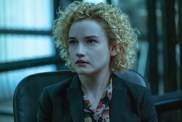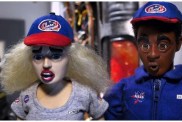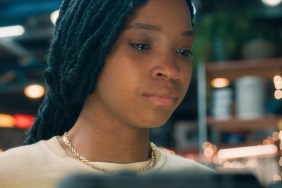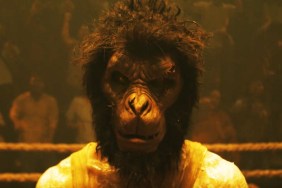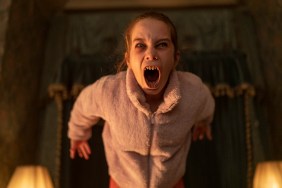Rawson Marshall Thurber first came to prominence when he wrote and directed the low-budget comedy Dodgeball: A True Underdog Story in 2004, starring Vince Vaughn and Ben Stiller, a movie that became a huge hit for 20th Century Fox as well as a cult comedy hit for the many fans who’ve embraced it since then.
Roughly nine years later and after a tangent into the world of indie dramas with Mysteries of Pittsburgh, Thurber is back with another high concept comedy called We’re the Millers.
This one stars Jason Sudeikis, recently departed from “Saturday Night Live,” as small-time pot dealer David Clark, who is strong-armed into smuggling a large amount of marijuana across the Mexican border by his supplier (Ed Helms). In order to pull off the seemingly impossible job, Dave rents an RV and convinces his stripper neighbor Rose (Jennifer Aniston) to pretend to be his wife with two local kids (Emma Roberts, Will Poulter) posing as their kids in order to help out in David’s “foolproof plan” to get past the border guards.
ComingSoon.net got on the phone with Thurber to talk about his return to studio comedies as well as the legacy of Dodgeball and how his approach to comedy has changed, if at all, in the nine years between the movies.
ComingSoon.net: I haven’t seen the movie yet, actually.
Rawson Marshall Thurber: Me neither, but I hear it’s great.
CS: Oddly, this movie’s been on my radar for a long time because the projectionist at a screening room where you had an early screening of the movie saw it back in January and was telling me how funny this movie “We’re the Millers” was and that I should look out for it. And now it’s coming out!
Thurber: You know what? If the projectionist was telling you that it’s good, then it’s good. That’s really like an early test.
CS: I think so, too. He’s pretty tough, so yeah. I do trust his judgment about it.
Thurber: That’s cool.
CS: I guess the first question you’ll get a lot is that it’s been a while since you’ve done a studio comedy, so what dragged you back into it? Was this something you’ve wanted to do again and this is the first one since “Dodgeball” that panned out?
Thurber: That’s a good question. Nothing dragged me back to it. Yeah, I had been looking to do another movie after “The Mysteries of Pittsburgh,” my second film, and I wanted to do something funny and something probably studio based, and it just took a little while to find the right one and get it to happen. You know, I got close on a couple of things that I thought I was going to direct, “Magnum P.I.,” I got close-ish and I was looking forward to that. There was another one, I was going to direct a version of Neil Strauss’ book “The Game.” I got excited about that. So, it was a sequence of near misses that take the time. A lot of times people go, “Hey, how come it took five years before you went back and made another movie?” I’m like, “Well, you know, there’s a process ofsomeone’s gotta be willing to put up the money to make a movie,” and a lot of the dance done behind the curtain takes a while before you come out on the stage. So, it wasn’t for lack of desire or lack of intention or focus, it was just the way the dice were getting rolled at the time.

CS: The screenplay for “We’re the Millers” has a pretty amazing pedigree. “Wedding Crashers” is an amazing comedy and I loved “Sex Drive” and “Hot Tub Time Machine.” They’re all great comedy writers, so was this something that had been tooling around for a while and you finally picked it up?
Thurber: Yeah, Ed, so “We’re the Millers” had been around for I think literally 10 years. So it was a script that had been around for a long time. Evan and Bob, it was their idea, they wrote the very first draft off of “Wedding Crashers.” I always thought it was a fantastic premise, just sort of a new take on a tried and true sort of genre, the family road trip movie. I don’t think the script was ever quite right until these two writers, Sean Anders and John Morris, came on and did a draft. New Line sent me that draft and I thought it was really funny and I sort of sat up in my chair and kinda raised my hand and said, “I’d like to do this.” New Line hired me on and I rewrote the script and kinda added to it and changed a few things, but it was really funny on the page from what Sean and John did. Then, we got Jason and then we got Jen and then we went and made it.
CS: I was curious whether either Jason or Jen were attached before you came on board or if there were any kind of actors attached when you came on in the screenplay stage and just developed it from there?
Thurber: There were no actors attached when I came on. So, I came on, I rewrote it, and then we went out to cast. Then, we got Jason first, and then we got Jen.
CS: So was this around the timeframe of “Horrible Bosses,” which they were in together or was it sort of a case where Jason sent it to Jen or vice versa or anything like that? Or was it a completely separate and random?
Thurber: “Horrible Bosses” had already, of course, had come out, and everyone liked it ’cause it did well. So Jen and Jason knew each other but it wasn’t quid pro quo. They didn’t come as a package deal. It was sequential. I’m sure it made it more intriguing to Jen, because she and Jason are good friends and I think a lot of fun to act with.
CS: I mean, I really like Jason as a comic and he’s someone who is very rare and different from others. I don’t know if I can put into words exactly what he does, but he makes things which are very straight very funny.
Thurber: (Laughs) I couldn’t agree more.
CS: It’s hard to describe it, but he’s made appearances in movies like “The Rocker” where he’s just funny by doing whatever he does with the material. I’m curious about developing the character of Dave with him, once you had the screenplay and building him out with what he can do and what he brings to the table?
Thurber: Oh, that’s a great question, and I agree with your sentiment. I mean, I’ve always been a big, big Jason Sudeikis fan and always thought he was not only the funniest guy on “SNL,” but also, the funniest guy in any movie he was in. I was just excited to give him the chance to shine completely, to be the lead of the picture. Boy, he just hit it out of the park, not that I was surprised. I think the only thing that was really surprising to me about working with Jason is actually how talented he is. I mean, I knew he was really funny, but I didn’t quite know what a fine actor he is. He really is. We worked very hard on the script, on the character. He brought so much to the role, and you know, he’s just lethally funny. He will give you three different takes on the same line. He can give you great one liners, great ad-libs. Boy, he’s a real pleasure. I mean, it’s almost like directing Jason is sort of directorial cheating because he just does it so well. You just kinda go, “That was great. Do it again, and thank you.” He’s that talented.
CS: You also have ringers in Nick Offerman and Kathryn Hahn. I mean, Kathryn Hahn, she’s probably one of the most underrated comic actresses out there. I feel like she appears in a movie for 10 minutes and you mention her name to anyone on the street and they have no idea who she is, which is a shame.
Thurber: Again, you are so right, Ed. I mean, I’m glad to hear you call them ringers. They both are. Kathryn Hahn is an absolute assassin. (Laughs) You know, she is so funny and she’s funny in everything. Everything she’s in. You know, Sudeikis doesn’t break very often. I guess I don’t think I’ve ever seen himI only saw him break one time and Kathryn Hahn made him break in a scene and start laughing. That’s how funny she is. But Nick Offerman, I mean, that guy could read the back of a cereal box and I’d be in stitches. I mean, I don’t know what it is about him, but he just makes me laugh. But to put those two together, we were assembling a murderer’s row of comedians to be in the picture, and I couldn’t imagine it without either of them in it.

CS: Have you seen “Somebody Up There Likes Me,” by any chance, the Nick Offerman movie?
Thurber: No, I have not.
CS: It’s a small movie that came out earlier this year, but Nick Offerman’s in it and he’s amazing.
Thurber: What’s it called again?
CS: “Somebody Up There Likes Me.”
Thurber: “Somebody Up There Likes Me,” okay.
CS: It’s a dark comedy like “Harold and Maude”very dark comedy and it’s the weirdest movie you’ll see in your life but it’s amazing, yeah.
Thurber: Oh, cool, I’ll check it out.
CS: When I talk to directors who do comedy, I’m always interested in the instincts necessary to direct comedy because it seems like such a specialized thing. When you have those writers on a screenplay, you know it will be funny but also while shooting and knowing how far to take things. I was curious if you could talk about that a little bit.
Thurber: Well, I think there are a few things at play, and certainly you want to start with a funny script. But more than just a funny script, you want to start with good characters and difficult situations because that typically will give you something funny, and you get to cast the right people, so there are a lot of steps in the process. But in terms of when you’re on the set and shooting a scene, I think I’m very interested in getting as many options as I can in terms of jokes, in terms of one-liners or punch lines or different takes on the same idea because as much as you’re pretty sure you know what’s going to work and what’s going to be funny, I think every comedy director would say the same thing, you never know until you put it up in front of an audience. Sometimes the jokes a thousand percent you thought they would kill will miss, and that’s just the littlest moment that you almost didn’t even notice on the day that gets a big laugh. You just have to be able to cover your bases that way. That’s part of the fun of editing a comedy, and why it’s different than a live performance or even stand-up. You get a chance to sort of hone and craft and smooth out your story in editorial. And you get this great feedback from an audience as you go because laughter obviously is not only auditory, it’s binary, right? You’re either laughing or you’re not. So it’s really helpful to put it up in front of an audience because they will absolutely tell you if something’s funny or if it’s not.
CS: Have you changed your style as far as directing comedies since “Dodgeball?” I think that movie is one of those movies that’s withstood the test of time. That was amazing because you actually wrote and directed it, which is also really rare for a studio comedy. So was it a very different process doing this one from making “Dodgeball”?
Thurber: Yeah, well, first of all, thank you. I’m glad you liked “Dodgeball.” It’s obviously very, very near and dear to my heart. Yeah, I think I’m a better director than I was when I made “Dodgeball.” I thinkI hope I am, at least. I hope I’m learning something. I think that in this process, it was the first time that I have directed a movie that I didn’t write myself from the very beginning, so that was interesting to me. Part of what came through was being a little bit more mercenary with what was working and what wasn’t, that I didn’t have as many sort of darlings, as many precious jokes that I thought couldn’t be cut and shouldn’t be changed. So it was really a much more clinical approach to comedy this time around, which was really freeing and lovely. I hope to repeat it. But then, in terms of like, the actual production and shooting, it felt pretty much the same and has been the same for almost 100 years. You know, and I think that this is an R-rated comedy versus the PG-13 comedy, so there are certain things we could get away with and try that we never could’ve tried on a PG-13 film. Obviously, the tone in “Dodgeball” versus the tone in “The Millers” were very different. You know, “Dodgeball” was very broad and an homage and sort of a film that both had its tongue firmly planted in its cheek and wore its heart on its sleeve. “Millers” is a much more straight-ahead film and we tried to make it as grounded as we could, because we thought that could heighten the stakes a bit, and that if we put everything real and just put these characters in a very difficult, ridiculous situation but everything else around it was real, we thought we’d get a lot of comedy out of it, and I think we did.

CS: I’m always curious to talk to filmmakers about going R-rated with comedy. When “Dodgeball” came out, making it PG-13 wasn’t a big deal, but since then there’s been the wave of “Wedding Crashers,” so was it a lot more freeing to be able to make this movie R-rated or was it kind of impossible not to make it R-rated?
Thurber: Well, it certainly was impossible to make it anything other than R-rated just based on the subject matter once you have drugs as a major element of the plot–it’s automatically R-rated. Then you just sort of ride the horse in the direction it’s going, where it’s like, “All right, well, if it’s R-rated, here we go.” Like, you know, I think that R-rated comedy is having its moment in the sun presently. I think it has to do with a lot of things. I’ve had many conversations with my very talented editor, Mike Sale about this. He cut “Millers” and did an incredible job. But, at least I hope you think he did an incredible job when you see it. He did, I can promise you. At any rate, so he had a very interesting theory about why R-rated comedy is so successful now, and perhaps PG-13 comedy, not as much. His perspective, which I agree with, is that what you used to get in PG-13 movies, even in the mid-2000’s is what you’re getting on television right now. You’re getting it with “The New Girl” and “The Mindy Project,” etc, you know, that sort of level of comedy exists for free on your television. Your television is now rectangular not square, as it used to be in the early 2000’s. So what you get at home on your couch is PG-13 comedy. Therefore, once you go to a theater and you’re paying your hard earned dollars to see PG-13 comedy, it doesn’t quite have the same fun. It doesn’t make the same imprint as it used to. That is his perspective on why R-rated comedy is having a renaissance, and I agree. I think it’s a really fascinating point and a good one.
CS: I’m sure you’re asked this question a lot, but how come we never got a sequel to “Dodgeball?” There’s such a fan base for it. Is it something you felt it was a good idea that worked better as a standalone comedy?
Thurber: I’ve been asked that question before, and it’s very kind of you. I don’t know, is the short answer. The longer answer is I feel like I said everything I needed to say about dodgeball in one film. Again, I managed to get it all in one.
CS: There’s not that many opportunities to make a movie about dodgeball, period, so I guess if you have something to say, you should get it all in there.
Thurber: (Laughs) You only get one shot at it, Ed, and you’ve gotta hit it out of the park. They don’t make a lot of movies about dodgeball anymore these days, in these studios.
CS: So I’d hate to ask what you’re thinking about doing next, because obviously I don’t want it to be one of those cases where I ask you and then we’re talking 10 years from now going, “Hey, where’ve you been for 10 years?” Have you figured out if you want to continue going along this kind of track, doing more comedies like this, or are you going to do a smaller movie again?
Thurber: Thank you for being curious. So I’ve got a few irons in the fire that I’m very excited about, but I can’t speak publicly about yet. I’m really focused on comedy and on a studio comedy next. So I want to do something that’s funny, that might have a little bit of scope to it, a little bit of size, a little bit of action, but definitely funny, so that’s what I’m aiming to do next.
CS: Listen, it was great talking to you, man. I can’t wait to see the movie. I think I’m seeing it next week sometime.
Thurber: Well, I hope you like it and thanks for the time and I appreciate it.
We’re the Millers opens nationwide on Wednesday, August 7.

